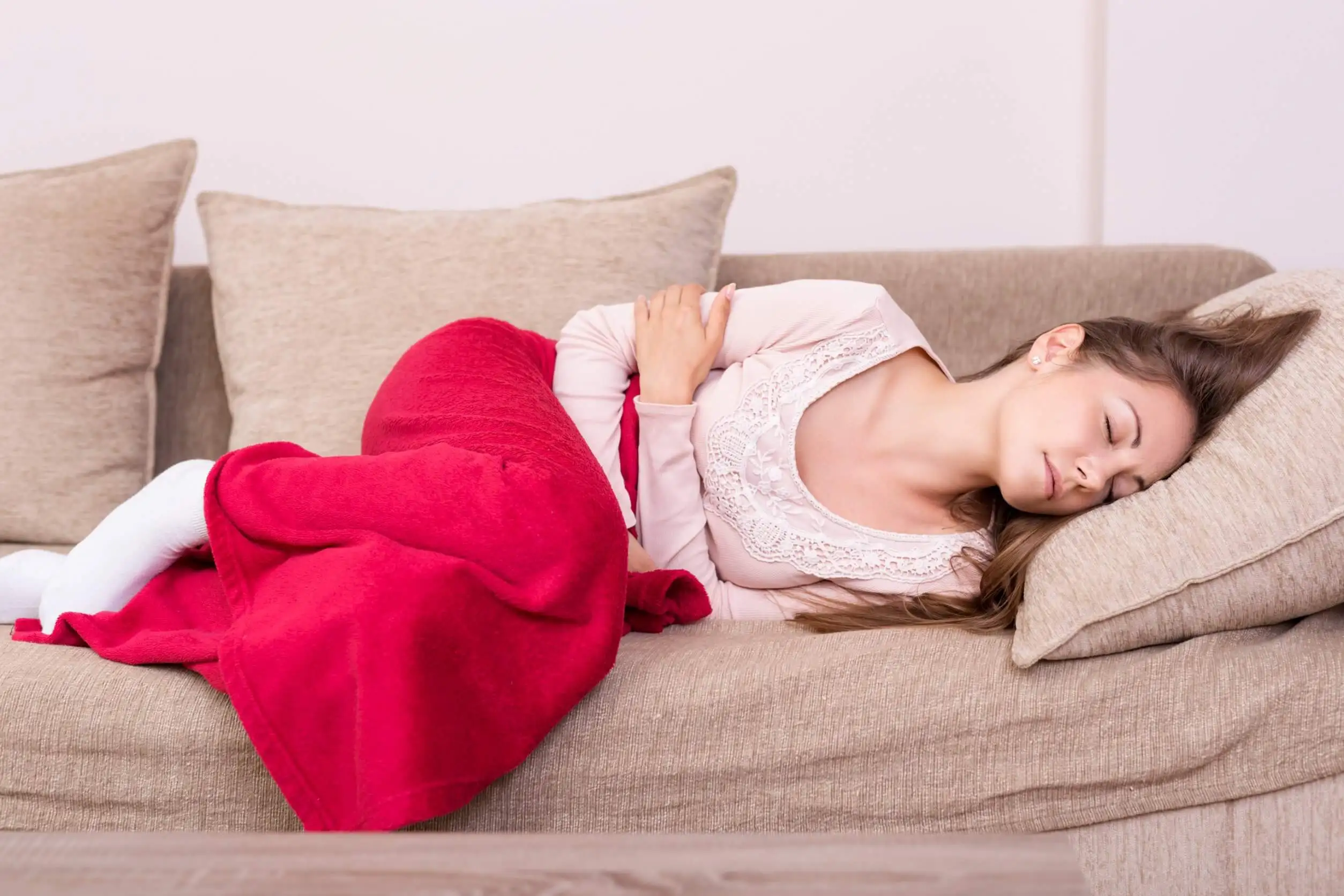What is Menstrual Fatigue and How Can You Deal With It?

One of the common signs prior to your period – and one that can even persist throughout your cycle – is menstrual fatigue. This sensation is more common than you may think and works as a warning of certain imbalances in the body.
If you’re exhausted after minimal efforts and perceive energy drops, it’s probably because you’re experiencing menstrual fatigue. Fortunately, it can be corrected. We’ll explain how in this article.
Menstrual fatigue and its causes

Also known as “menstrual fatigue,” this type of fatigue is part of premenstrual syndrome (PMS), which is defined by the Office of Women’s Health as “a set of symptoms that occur one to two weeks before your period.”
In this phase, you’re more likely to experience anxiety, irritability, mood swings, headaches, bloating, and weakness. The degree of symptoms increases with rises in ambient temperature.
As the cycle progresses, the sensations diminish until, finally, the fatigue disappears. Its causes are associated with the factors listed below.
- Hormones: Estrogen and progesterone alterations greatly influence fatigue. The follicular and ovulatory phases are the ones that demand energy and hormonal support, but when there are imbalances, you may feel fatigued.
- Iron deficiency: MPG Journal specifies that iron deficiency leads to exhaustion, palpitations, and dizziness. In addition, you may suffer heavy menstruation or iron deficiency anemia due to a lack of iron.
- Cramps: During menstruation, inflammatory agents are amplified which, when mixed with hormones, trigger cramps. The intensity of the pain sometimes leads to weakness and dizziness.
- Sugar: During the days of your cycle, you may feel the urge to eat more sweets than usual. At the time, you will feel a boost of energy, but once it goes down, fatigue usually envelops you. The only solution you’ll find is to satiate a new craving, putting you in a vicious cycle.
We think you may also enjoy reading this article: How Does the Menstrual Cycle Affect Women’s Soccer?
How to relieve menstrual fatigue
Keep track of how long the discomfort lasts and how much it affects you. As long as they don’t worsen, take note of the following tips to reduce menstrual fatigue.
1. Eat a proper diet
Improve your eating habits and respect regular meal times. Opt for snacks that don’t contribute to low blood sugar. Include vegetables and legumes in your diet, as well as protein-based foods, especially to take as a snack when you leave the house. Another recommendation is foods such as spinach to address the iron deficiency that may occur during periods.
Similarly, avoiding abundant dishes is useful against menstrual fatigue. However, it’s also a good idea to avoid long spaces between meals as the body uses all its energy for digestion, and this triggers fatigue. One solution for this is healthy snacks.
2. Keep track of your cycle
Take advantage of technology and install an application on your phone to monitor your period. These systems announce the proximity of your period and mark the day when your cycle starts and when it ends. They also allow you to record your emotions and energy levels.
All this information is useful to build the pattern of the body before and during menstruation, which helps you anticipate symptoms and react better to fatigue.
3. Exercise
According to an article published by NeuroRehab News, aerobic exercise brings many benefits in the middle of your period, especially when it comes to pain and your overall quality of life. By exercising, you bring energy to the body and release endorphins. Walking, yoga and cycling are all beneficial activities.
4. Stay hydrated to fight fatigue

Dehydration and fatigue go hand in hand. To improve this feeling, try to drink at least two liters (about eight glasses) of water daily and get some fresh air. Don’t drink any soft drinks, coffee, or other sugary drinks, as these types of beverages can cause gas and insomnia.
On the other hand, doctoral research published by the University of Santiago de Compostela indicates that alcohol consumption is associated with a moderate increase in PMS, which, as you know, leads to fatigue as one of its signs.
5. Rest
Sleeping at least 8 hours at night is proven to lead to less menstrual fatigue in the mornings. Also, at least one hour before going to bed, make sure to avoid screens.
The Revista de la Facultad de Medicina de México explains that the use of electronic devices affects insufficient sleep syndrome, since nighttime exposure to light from screens interferes with circadian rhythms and melatonin production.
The consequences are the alteration of normal sleep architecture and drowsiness the next day. Some additional recommendations for getting good quality rest are:
- Create a bedtime schedule. Be on time every night.
- Stay away from coffee after noon.
- Use a menstrual protection system that makes you feel secure so you’re not on the lookout for leaking blood.
- Reduce noise for a restful night’s sleep.
6. Relax
Taking care of your mental health is important to alleviate the heaviness generated by menstrual fatigue. High levels of stress cause hormonal fluctuations that lead to irregular cycles, among other effects. Practice breathing exercises, yoga, or devote a few hours to a hobby. These activities will relax you and calm your period fatigue.
Like this article? You may also like to read: Four Pieces Of Advice To Reduce Your Menstrual Flow
When is it time to go to the doctor?
No matter how frequent the cases of period fatigue are, if the physical symptoms become disabling, it’s time to visit the gynecologist. The severity of the sensations may be due to premenstrual dysphoric disorder. This condition includes manifestations of major medical concern, such as major depression and anxiety.
Also, there are diseases associated with discomfort before and during the period: for example, polycystic ovarian syndrome, thyroid problems, and severe anemia.
All cited sources were thoroughly reviewed by our team to ensure their quality, reliability, currency, and validity. The bibliography of this article was considered reliable and of academic or scientific accuracy.
- Carrillo-Mora P, Baraja-Martínez KG, Rangel-Caballero MF, Sánchez-Vázquez I. Trastornos del sueño: ¿qué son y cuáles son sus consecuencias? Revista de la Facultad de Medicina de México. Vol. 61. Núm. 1. México; 2018. http://www.scielo.org.mx/scielo.php?script=sci_arttext&pid=S0026-17422018000100006
- Fernández Míguez MDM. Estudio epidemiológico de los factores de riesgo del síndrome premenstrual y del trastorno disfórico premenstrual. España; 2019. https://dialnet.unirioja.es/servlet/tesis?codigo=254018
- Mas Esteve Hematología Hemoterapia M. Impacto del déficit de hierro y la anemia ferropénica en la salud de la mujer. MPG Journal. España; 2018. https://www.mendeley.com/catalogue/9d3bae16-6d45-364c-8b30-f02612330962/?utm_source=desktop&utm_medium=1.19.4&utm_campaign=open_catalog&userDocumentId=%7Bf83f13ad-2535-47ab-a7cb-e22323777a21%7D
- Madroñero M. El papel del ejercicio en el dolor menstrual. NeuroRehab News. España; 2021. https://www.mendeley.com/catalogue/eccb4200-b313-3c84-b841-0beb45ffa708/?utm_source=desktop&utm_medium=1.19.4&utm_campaign=open_catalog&userDocumentId=%7B957c3e6d-9077-4159-ac1c-f26a3d44f8e3%7D
- Síndrome premenstrual. Oficina para la Salud de la Mujer. Estados Unidos; 2021. https://espanol.womenshealth.gov/menstrual-cycle/premenstrual-syndrome
This text is provided for informational purposes only and does not replace consultation with a professional. If in doubt, consult your specialist.








